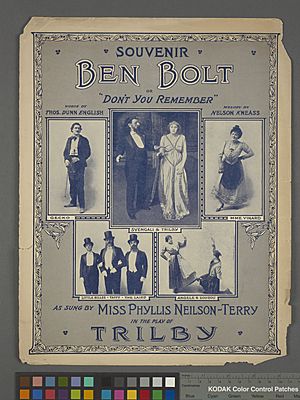Ben Bolt facts for kids
"Ben Bolt" (Roud 2653) is a popular sentimental ballad. This means it's a song that tells a story and expresses strong feelings, often about love or sadness. The words for the song came from a poem written by Thomas Dunn English. It became very famous all over the English-speaking world during the 1800s.
Contents
The Song's Words
The poem has five parts, called stanzas. It describes old memories from the person singing the song. This person talks to someone named Ben Bolt about each memory.
The first part of the poem talks about a woman named Alice. It describes her life and how she passed away.
Don't you remember sweet Alice, Ben Bolt,—
Sweet Alice whose hair was so brown,
Who wept with delight when you gave her a smile,
And trembled with fear at your frown?
In the old church-yard in the valley, Ben Bolt,
In a corner obscure and alone,
They have fitted a slab of the granite so gray,
And Alice lies under the stone.
There's a small difference in the fourth part of the poem. In the original poem, it started like this:
And don’t you remember the school, Ben Bolt,
With the master so cruel and grim,
And the shaded nook in the running brook
Where the children went to swim?
But when the poem was turned into a song, these lines were changed a little. They became:
With the master so kind and so true.
And the little nook by the clear-running brook,
Where we gathered the flowers as they grew?
The author, Thomas Dunn English, wasn't happy about this change. He wrote to Harper's Bazaar magazine. He said that school teachers from his childhood were "cruel and grim," not "kind and true." He felt they often used a rod to teach boys.
How "Ben Bolt" Became Famous
I am feeling very well and enjoying life as well as an old man can, but this eternal 'Ben Bolt' business makes me so infernally weary at times that existence becomes a burden. The other night, at a meeting of a medical association at my home in Newark, some one proposed that all hands join in singing 'Ben Bolt,' whereupon I made a rush for the door, and came very near forgetting the proprieties by straightway leaving home. However, I recovered my equilibrium and rejoined my friends. I don't think that General Sherman ever grew half so tired of 'Marching Through Georgia' as I have of that creation of mine, and it will be a blessed relief to me when the public shall conclude to let it rest.
—Thomas Dunn English, circa 1895
Soon after it was first published, "Ben Bolt" became incredibly popular across the country. It made Thomas Dunn English a well-known writer. The song stayed famous throughout the 1800s. Many people wrote their own versions of the lyrics or made fun of the song in a friendly way.
In Books
"Ben Bolt" became popular again in 1894. This happened when George du Maurier published his novel Trilby. The song is an important part of the story. In the book, the main character, Trilby O'Ferrall, sings "Ben Bolt" very badly at first. Later, when a character named Svengali loses his special powers, Trilby again cannot sing "Ben Bolt" well. The success of the novel made people interested in the songs mentioned in Trilby. When he was older, Thomas Dunn English even gave a copy of his "Ben Bolt" poem to a charity auction in 1895.
Because "Ben Bolt" was so well-known in the 1800s, it was often mentioned in books set during that time. This happened whether the books were published then or many years later.
- It is mentioned in the novel Dr. Sevier by George Washington Cable.
- Laura Ingalls Wilder included it in her book By the Shores of Silver Lake.
- Leopold Bloom thinks about "Ben Bolt" in James Joyce's novel Ulysses.
- James Thurber drew pictures for "Ben Bolt" as part of a series for The New Yorker magazine.
In Movies
"Ben Bolt" has also appeared in several movies:
- The actress Norma Talmadge would have the song played to help her get ready for sad scenes.
- In the movie Gone with the Wind, Vivien Leigh, playing Scarlett O'Hara, sings a few lines from "Ben Bolt."
- In the 1931 film Girls About Town, Lilyan Tashman as Marie Bailey sings some lines. She complains about having to sing such an "old-fashioned song."
In Other Music
Many musicians have created their own versions or pieces based on "Ben Bolt":
- Charles Grobe made [Variations on] "Ben Bolt" in 1850.
- William Vincent Wallace created Grande fantaisie de concert sur la ballade Americaine "Ben Bolt" in 1853.
- John Philip Sousa composed the "Ben Bolt" March in 1888.
- James Bellak wrote Ben Bolt's Waltz in 1850.
Many singers have also recorded "Ben Bolt," from older artists like Geraldine Farrar and John McCormack to more recent ones like Joe Dolan and Johnny McEvoy.
External Links
- "Ben Bolt" at Bartleby.com
- "Ben Bolt" (includes MIDI sound file)
 | Precious Adams |
 | Lauren Anderson |
 | Janet Collins |


